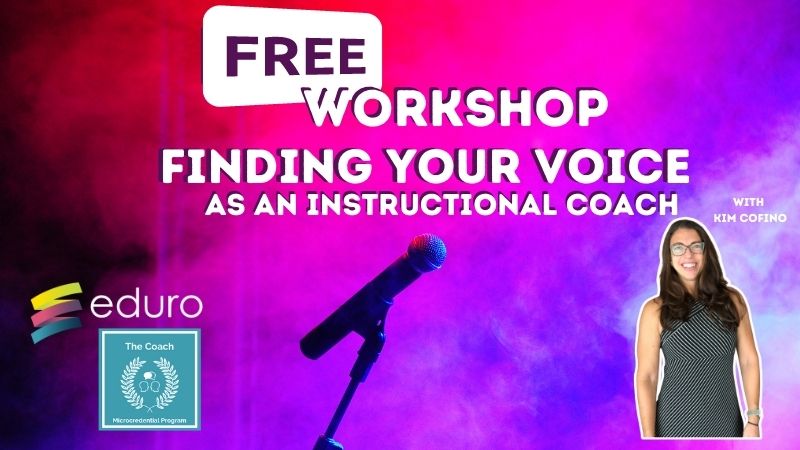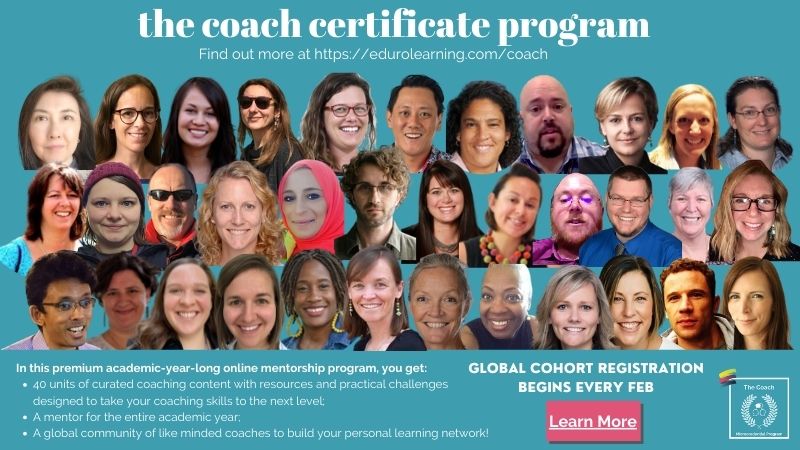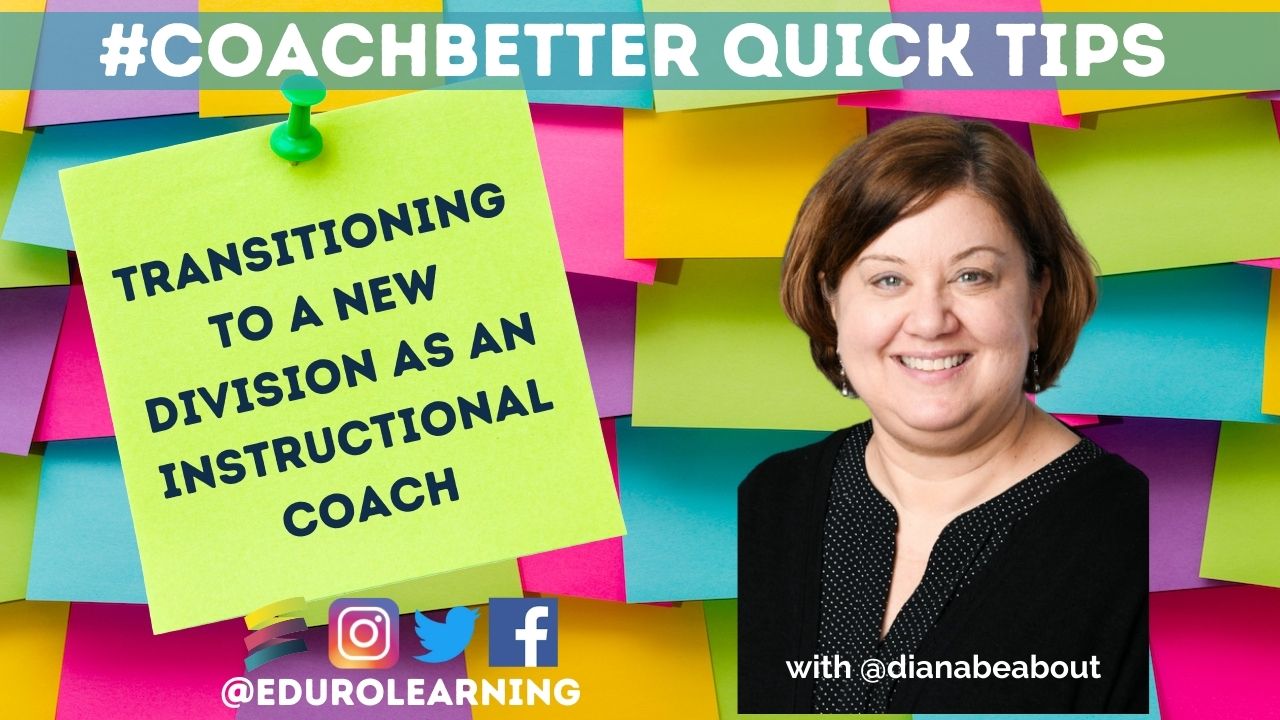My first move from classroom teacher to instructional coach involved a change from middle school to high school and in my first role as an ed-tech coach I was assigned to the elementary or primary division. In both cases, I had to make adjustments to my approaches in coaching, which included addressing potential concerns in having little to no previous experience in those divisions or age group levels.
Over time, I have moved between roles from primary or elementary through secondary. I now have the experience and confidence to work within a variety of contexts.
However, I’ve met classroom teachers moving into coaching roles and coaches moving within a school or organization or to a new one that involves working in a school-wide role or a different division than they have had experience in.
This can lead to concerns about how they will be perceived in their new role. How can they show themselves, administrators, and the school community that making this type of change will benefit all involved?
5 Questions to Help Prepare for Change
In this post, I’m going to share 5 questions you can address as you make a change from a context you are familiar with in regards to age groups or content area to a coach in a new environment.
1: How can you focus on building relationships and getting oriented in a new division?
Who do you already know? Who do you need to get to know to started? Where can you get information about programs and curriculum? What meetings can you be involved in to get an understanding of how the school or division functions? Ask questions and get to know how things work and do a lot of listening. This shows that you are being pro-active and are engaged in building relationships and your own capacity to be an effective team member.
2: How can you clearly communicate your role as a coach?
Whenever and however you can, it is important that your role as a coach is understood by all community members. When and how will you work with teachers, individually and in teams? What are your priorities and responsibilities? This is an important step for any coach, but especially when transitioning between different school levels.
Find YOUR Unique Voice as a Coach!

We know that coaching conversations are an art. Finding just the right questions, just the right tone, and just the right phrases for YOU as an instructional coach, that work just right with your coachees, is a special skill. When we hear highly experienced coaches having a coaching conversation, their conversational choices seem so natural and easy. That’s because they have found their voice as a coach! Are you ready to find yours?
Join Kim for a free workshop, available right now, to learn the concrete strategies that I use with my private mentoring clients and inside The Coach Certificate and Mentorship program! Bonus: it’s pre-recorded, so you don’t have to wait to watch – and you can pause & replay whenever you need it! Are you ready to feel just as natural and confident in your coaching conversations as your coaching idols? Check out the Finding Your Voice as an Instructional Coach workshop at http://edurolearning.com/voice to get started!
3: How can you show respect for and learn from the grade level and content experts you are now working with?
This is connected with your role as a coach – unless the role is specific to certain areas like math or literacy, your role as an instructional coach or ed tech coach is to support teachers and students in addressing academic goals -and this does not require you to be the expert in all things. What do you need to know from the teachers you are working with to best support them? Joellen Killon’s list of ten roles of a school-based coach includes Learner. And you will learn A LOT! But as a coach, you will bring in your strategies to facilitate thinking, collaborate, and provide support and input as needed.
4: How can your experience can be scaled to a different age group and/or content area?
As a classroom teacher turned coach, I was able to take instructional strategies and digital tools that I used in my own classroom and show how they could be adapted to other grade levels and content areas. This takes some creativity and collaboration but effective and engaging strategies and tools can be adapted to a variety of contexts.
5: How can you communicate and demonstrate coaching approaches that are effective across grade levels and content areas?
As with instructional strategies, effective coaching strategies are flexible and adaptable and can be used in a variety of situations. What coaching strategies might you need to explicitly share with teachers and administrators so they can understand how and why they are used? As part of communicating your coaching role, what needs to be addressed in relation to what coaching looks like and how it works?
Making the move from the familiar as a classroom teacher or coach to a new experience with a different division or grade level or even to a whole school or district role can be overwhelming and challenge your confidence. But it can also be very exciting and provide so many new opportunities for you and the teachers and students you work with. Use these five questions to guide your thinking and interactions with others and build your confidence and experience in working in a new environment. Be vulnerable and humble but also know you bring experience and energy to the table in making this kind of transition in your career. There are all sorts of learning and growth opportunities to experience.
Watch the video!
Ready to make a successful transition to a new division, as an instructional coach?
If this is the kind of professional learning conversation you want to be having, please join us for the next global cohort of The Coach Certificate & Mentorship Program!

The Coach is an academic year long mentorship & certification program, where you get to learn with a global cohort of coaches. You get 40 weeks of coaching content AND a mentor for the entire academic year.
The Coach is the ONLY online certification program designed for K12 Instructional Coaches that includes an entire academic year of mentorship to provide personalized professional learning in a global, community driven environment.
Inside The Coach, you will go from feeling overwhelmed and frustrated about all of your coaching responsibilities to calm, capable and confident that you can handle any coaching situation that comes your way. You will learn how to evaluate and then transform your coaching program from start to finish.
It’s the perfect way to level up your coaching strategies to be able to work with not only the super willing and engaged teachers, but also the middle of the road teachers and those that are maybe more resistant to coaching at this moment in time.
Global cohort registration opens every February!
Find out more: https://edurolearning.com/coach

Recent Comments